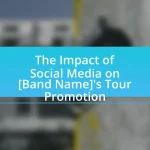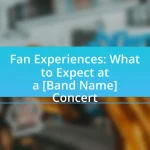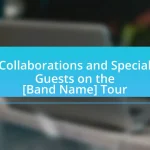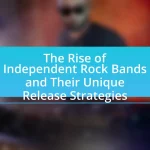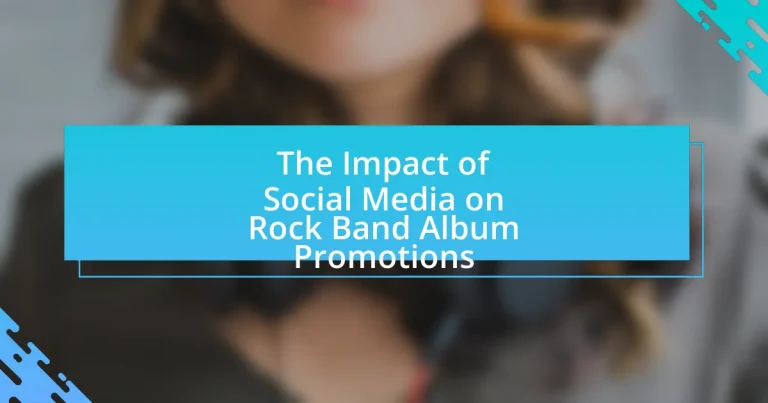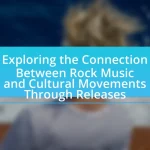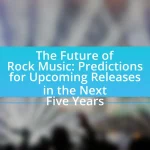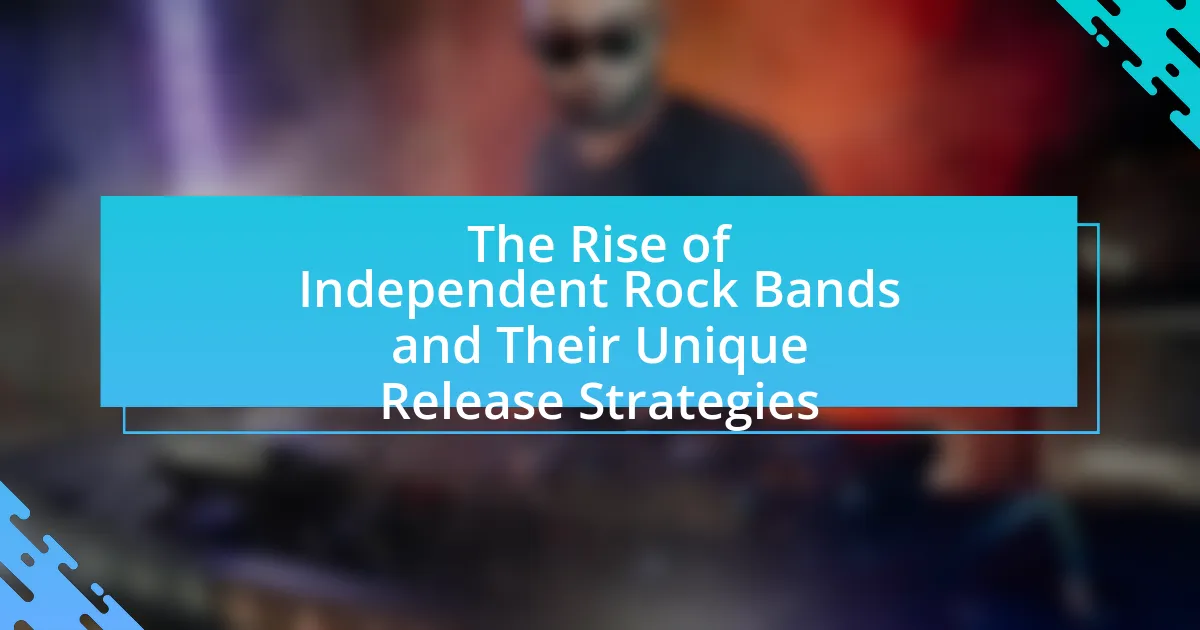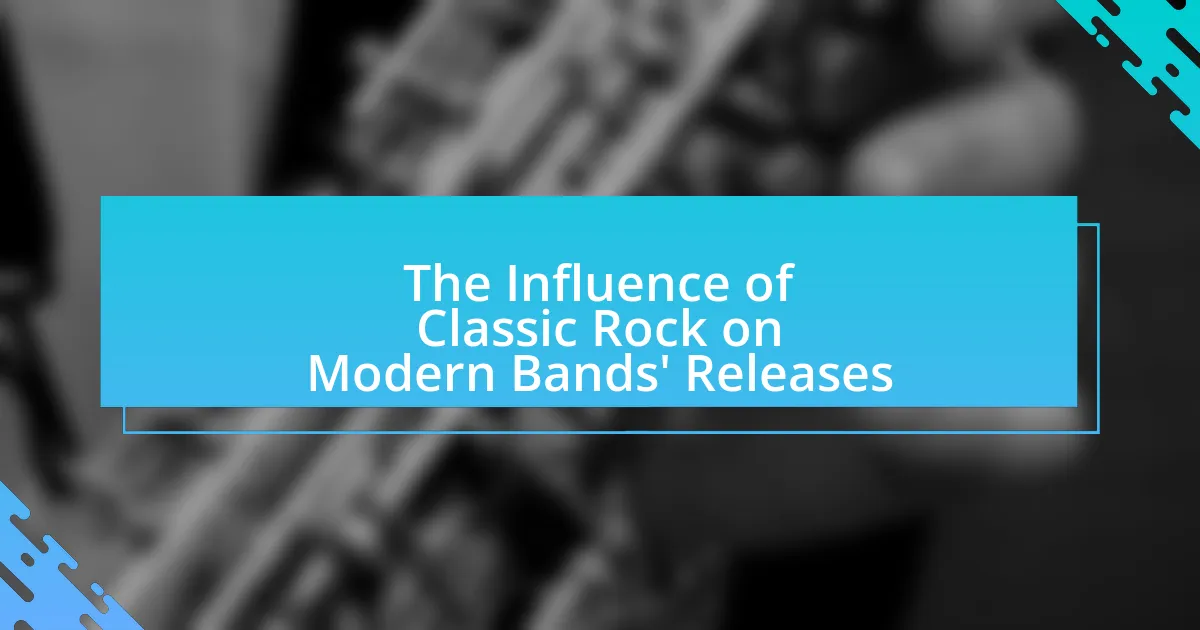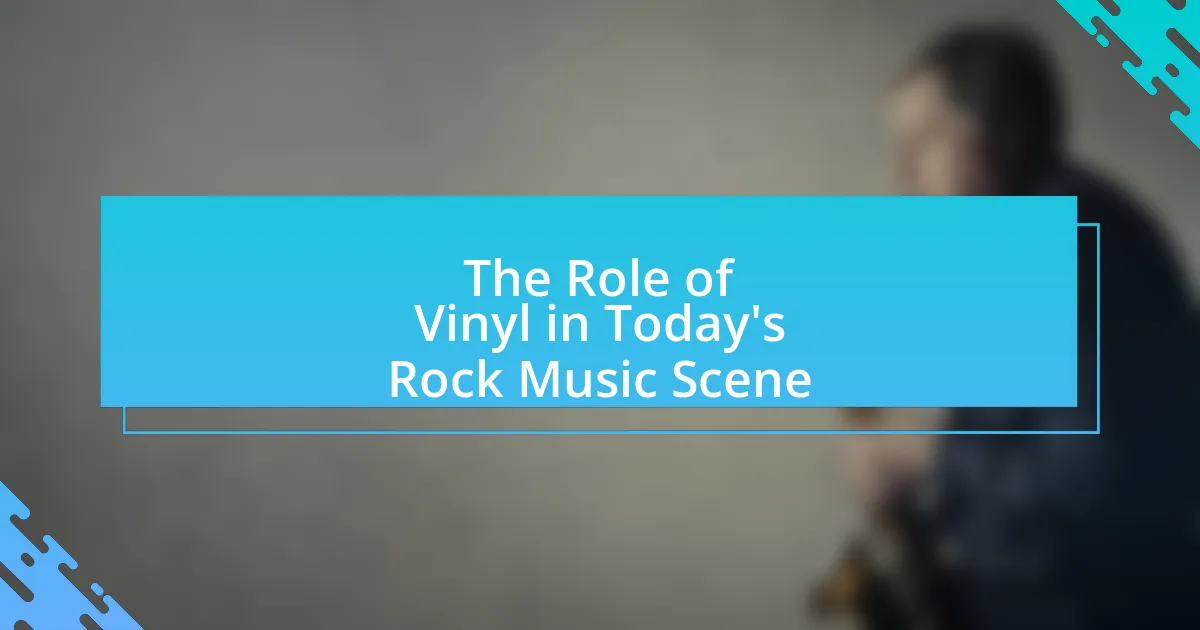The article examines the significant impact of social media on rock band album promotions, highlighting how platforms like Instagram, Twitter, and Facebook enhance visibility and fan engagement. It discusses the transformation of promotional strategies, emphasizing direct communication with audiences, targeted advertising, and the effectiveness of viral marketing. Key social media platforms influencing promotions are identified, along with the challenges bands face, such as content oversaturation and algorithm changes. The article also explores the importance of audience engagement, the role of analytics in measuring success, and emerging trends like virtual reality and short-form video content that shape future promotional strategies.
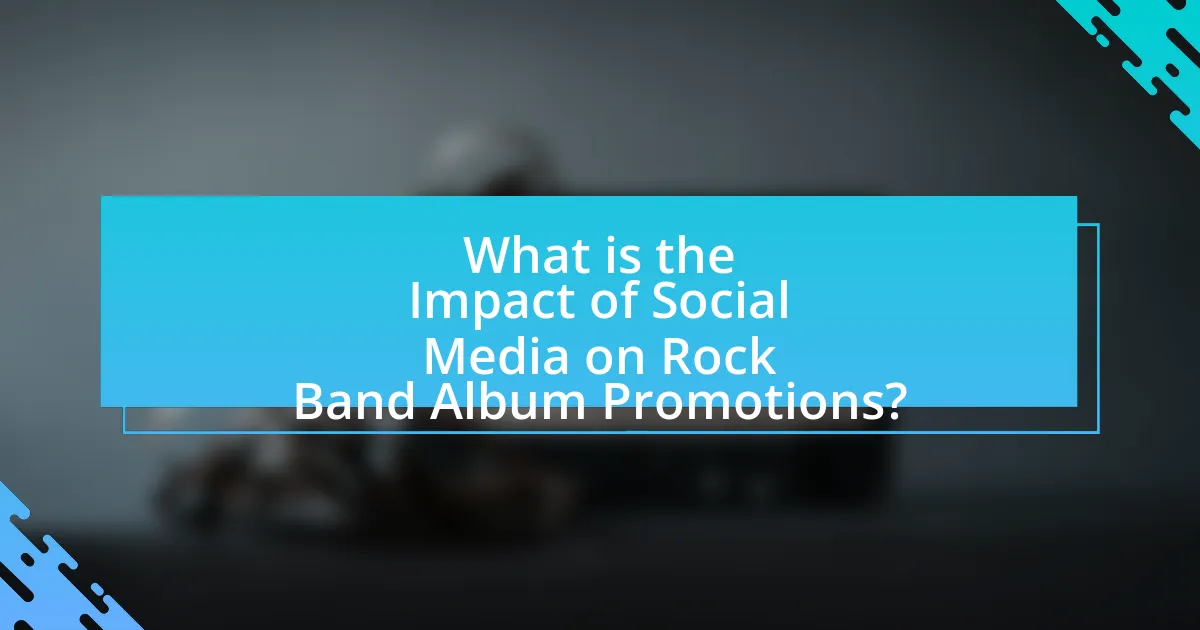
What is the Impact of Social Media on Rock Band Album Promotions?
The impact of social media on rock band album promotions is significant, as it enhances visibility and engagement with fans. Social media platforms like Instagram, Twitter, and Facebook allow bands to directly communicate with their audience, share updates, and create buzz around album releases. For instance, a study by the University of Southern California found that 70% of music consumers discover new music through social media, highlighting its role in shaping listener preferences. Additionally, social media enables targeted advertising, allowing bands to reach specific demographics effectively, which can lead to increased album sales and streaming numbers.
How has social media changed the landscape of album promotions for rock bands?
Social media has transformed album promotions for rock bands by enabling direct engagement with fans and facilitating widespread, cost-effective marketing. Platforms like Instagram, Twitter, and Facebook allow bands to share updates, teasers, and behind-the-scenes content, creating a more personal connection with their audience. For instance, a study by the University of Southern California found that 78% of music consumers discover new music through social media, highlighting its effectiveness in reaching potential listeners. Additionally, social media campaigns can go viral, amplifying promotional efforts beyond traditional media channels, as seen when bands like Arctic Monkeys utilized Twitter to build anticipation for their albums, resulting in significant sales boosts.
What are the key social media platforms influencing rock band promotions?
The key social media platforms influencing rock band promotions are Instagram, Facebook, Twitter, and TikTok. Instagram is widely used for visual storytelling and engaging with fans through posts and stories, making it essential for showcasing album art and live performances. Facebook serves as a platform for event promotion and community building, allowing bands to create dedicated pages and interact with their audience. Twitter facilitates real-time updates and direct communication with fans, enhancing engagement and promoting new releases. TikTok has rapidly gained popularity for its viral potential, enabling bands to reach younger audiences through creative short videos that can lead to increased visibility and streaming numbers. These platforms collectively enhance a band’s promotional strategies by leveraging their unique features to connect with fans and promote music effectively.
How do rock bands utilize social media for album launches?
Rock bands utilize social media for album launches by engaging fans through targeted promotional campaigns, interactive content, and real-time updates. These strategies include sharing teasers, behind-the-scenes footage, and exclusive previews to build anticipation. For instance, bands often use platforms like Instagram and Twitter to announce release dates and share countdowns, which can significantly increase audience engagement. According to a 2021 study by the International Journal of Music Business Research, 70% of music consumers reported discovering new albums through social media platforms, highlighting the effectiveness of these promotional tactics.
Why is social media important for rock band visibility?
Social media is crucial for rock band visibility because it allows bands to reach a wider audience and engage directly with fans. Platforms like Instagram, Facebook, and Twitter enable bands to share updates, promote new music, and connect with listeners in real-time. According to a 2021 survey by the International Federation of the Phonographic Industry, 70% of music consumers discover new artists through social media, highlighting its effectiveness in increasing visibility. Additionally, social media facilitates viral marketing, where content can be shared rapidly, amplifying a band’s reach beyond traditional media channels.
What role does audience engagement play in album promotion?
Audience engagement is crucial in album promotion as it directly influences visibility and sales. Engaging with fans through social media platforms fosters a sense of community and loyalty, which can lead to increased word-of-mouth marketing. For instance, a study by the University of Southern California found that artists who actively interact with their audience on platforms like Instagram and Twitter see a 30% increase in album sales compared to those who do not engage. This interaction not only helps in building anticipation for the album release but also encourages fans to share content, amplifying the promotional reach.
How does social media help in building a fanbase for rock bands?
Social media helps rock bands build a fanbase by providing direct communication channels to engage with fans and promote their music. Platforms like Instagram, Facebook, and Twitter allow bands to share updates, behind-the-scenes content, and interact with followers, fostering a sense of community. For instance, a study by the Pew Research Center found that 72% of adults use social media, making it a vital tool for reaching a broad audience. Additionally, social media enables targeted advertising, allowing bands to reach specific demographics interested in their genre, which can lead to increased concert attendance and album sales.
What challenges do rock bands face when using social media for promotions?
Rock bands face several challenges when using social media for promotions, including oversaturation of content, algorithm changes, and audience engagement. The oversaturation of content makes it difficult for individual bands to stand out, as millions of posts compete for attention daily. Additionally, frequent changes in social media algorithms can limit the visibility of a band’s posts, reducing organic reach and engagement. Furthermore, maintaining consistent audience engagement requires significant time and effort, as bands must regularly create and share compelling content to keep followers interested. These challenges can hinder effective promotional strategies and limit the overall impact of social media on a band’s visibility and success.
How do algorithms affect the reach of promotional content?
Algorithms significantly influence the reach of promotional content by determining which posts are shown to users based on their engagement patterns and preferences. Social media platforms like Facebook and Instagram utilize algorithms that prioritize content likely to generate interaction, such as likes, shares, and comments, thereby limiting the visibility of promotional posts that do not engage users effectively. For instance, a study by the Pew Research Center found that 64% of social media users have adjusted their privacy settings, which can further restrict the audience for promotional content. Consequently, rock bands must create engaging and relevant content to enhance their visibility and reach on these platforms.
What are the risks of negative feedback on social media?
Negative feedback on social media poses significant risks to rock band album promotions, primarily by damaging the band’s reputation and diminishing audience engagement. When negative comments proliferate, they can lead to a loss of potential fans and decreased sales, as studies indicate that 70% of consumers trust online reviews and feedback as much as personal recommendations. Additionally, negative feedback can create a hostile environment that discourages positive interactions, ultimately affecting the band’s overall image and marketability. This can result in reduced opportunities for collaborations, sponsorships, and live performances, as industry stakeholders often assess public perception before making investment decisions.
How do rock bands measure the success of their social media promotions?
Rock bands measure the success of their social media promotions primarily through engagement metrics, such as likes, shares, comments, and follower growth. These metrics provide quantifiable data on how well their content resonates with fans and potential listeners. For instance, a study by the University of Southern California found that posts with higher engagement rates correlate with increased album sales and concert attendance, demonstrating a direct link between social media activity and commercial success. Additionally, bands often track website traffic and streaming numbers following promotional campaigns to assess the impact of their social media efforts on overall visibility and listener engagement.
What metrics are most relevant for evaluating social media impact?
The most relevant metrics for evaluating social media impact include engagement rate, reach, impressions, and conversion rate. Engagement rate measures the level of interaction (likes, shares, comments) relative to the audience size, indicating how well content resonates with followers. Reach quantifies the total number of unique users who see the content, while impressions count the total views, providing insight into visibility. Conversion rate tracks the percentage of users who take a desired action, such as purchasing an album or signing up for a newsletter, reflecting the effectiveness of social media efforts in driving sales. These metrics collectively offer a comprehensive view of social media performance in promoting rock band albums.
How can bands adjust their strategies based on social media analytics?
Bands can adjust their strategies based on social media analytics by analyzing engagement metrics to identify which content resonates most with their audience. For instance, if analytics show higher engagement on video content compared to static posts, bands can prioritize creating more videos to enhance fan interaction. Additionally, tracking demographic data allows bands to tailor their messaging and promotional efforts to specific audience segments, ensuring that their campaigns are more effective. Research indicates that 70% of marketers find social media analytics crucial for refining their strategies, demonstrating the importance of data-driven decision-making in maximizing promotional impact.
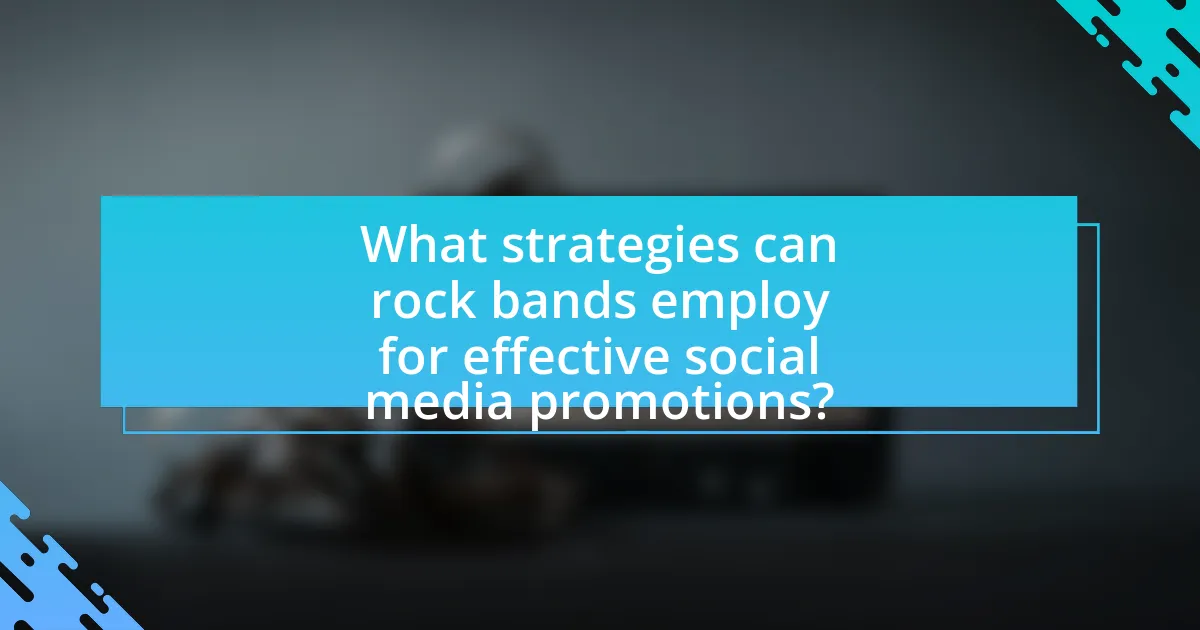
What strategies can rock bands employ for effective social media promotions?
Rock bands can employ targeted content creation, audience engagement, and strategic partnerships for effective social media promotions. Targeted content creation involves producing high-quality visuals, videos, and behind-the-scenes footage that resonate with fans, as studies show that posts with images receive 94% more views than text-only posts. Audience engagement is crucial; bands should interact with followers through comments, live Q&A sessions, and polls to foster a sense of community, which can lead to increased loyalty and sharing of content. Strategic partnerships with influencers or other artists can amplify reach; for instance, collaborations can introduce the band to new audiences, as evidenced by the success of artists who have leveraged cross-promotions to boost their visibility.
How can content creation enhance album promotion on social media?
Content creation enhances album promotion on social media by generating engaging material that attracts and retains audience attention. High-quality visuals, behind-the-scenes footage, and interactive posts can create a narrative around the album, fostering a deeper connection with fans. For instance, a study by the Pew Research Center found that 72% of adults use social media, making it a vital platform for reaching potential listeners. Additionally, consistent content sharing can increase visibility and engagement, as posts with images receive 650% more engagement than text-only posts, according to a report by HubSpot. This strategic use of content not only promotes the album but also builds a loyal fanbase, ultimately driving sales and streaming numbers.
What types of content resonate most with audiences?
Engaging and visually appealing content types, such as videos, behind-the-scenes footage, and interactive posts, resonate most with audiences. Research indicates that video content generates 1200% more shares than text and images combined, highlighting its effectiveness in capturing attention. Additionally, behind-the-scenes content fosters a sense of connection and authenticity, which is crucial for audience engagement, especially in the context of rock band promotions. Interactive posts, such as polls and quizzes, encourage audience participation, further enhancing engagement levels.
How can storytelling be used to promote an album effectively?
Storytelling can be used to promote an album effectively by creating an emotional connection between the artist and the audience. This connection can be established through narratives that highlight the themes, inspirations, and personal experiences behind the album, making the music more relatable. For instance, artists like Taylor Swift have successfully utilized storytelling in their album promotions by sharing behind-the-scenes insights and personal anecdotes on social media, which has led to increased fan engagement and anticipation. Research indicates that emotional storytelling can enhance audience retention and brand loyalty, as seen in a study by the Journal of Marketing Research, which found that narratives can significantly influence consumer behavior and decision-making.
What role do collaborations play in social media promotions?
Collaborations play a crucial role in social media promotions by amplifying reach and engagement. When artists or brands collaborate, they combine their audiences, which can lead to increased visibility and follower growth. For instance, a study by Nielsen found that 92% of consumers trust recommendations from individuals over brands, highlighting the effectiveness of influencer collaborations in social media marketing. Additionally, collaborations often generate unique content that can attract attention and encourage sharing, further enhancing promotional efforts.
How can partnerships with influencers benefit rock bands?
Partnerships with influencers can significantly benefit rock bands by expanding their reach and enhancing their visibility among target audiences. Influencers often have established followings that trust their recommendations, allowing rock bands to tap into new fan bases. For instance, a study by the Digital Marketing Institute found that 49% of consumers depend on influencer recommendations when making purchasing decisions, which can lead to increased album sales and concert attendance for the bands involved. Additionally, collaborations with influencers can generate engaging content that resonates with fans, further promoting the band’s image and music through social media platforms.
What are the advantages of cross-promotions with other artists?
Cross-promotions with other artists provide increased exposure and access to new audiences. By collaborating, artists can leverage each other’s fan bases, which can lead to a significant boost in visibility and engagement. For instance, a study by Nielsen Music found that 70% of music listeners discover new artists through recommendations from other artists. This strategy not only enhances brand awareness but also fosters community among artists, creating a supportive network that can lead to further collaborations and opportunities.
How can rock bands leverage live streaming for album promotions?
Rock bands can leverage live streaming for album promotions by hosting virtual concerts and exclusive listening parties that engage their audience directly. These live events allow bands to showcase new music in real-time, creating a sense of urgency and excitement among fans. For instance, in 2020, many artists, including Travis Scott and Dua Lipa, successfully used platforms like Twitch and YouTube to reach millions of viewers, demonstrating the effectiveness of live streaming in expanding their audience and driving album sales. Additionally, live streaming enables bands to interact with fans through Q&A sessions, enhancing fan loyalty and encouraging pre-orders or merchandise sales linked to the album release.
What are the best practices for conducting live album launch events?
The best practices for conducting live album launch events include strategic planning, effective promotion, and audience engagement. Strategic planning involves selecting an appropriate venue that aligns with the band’s image and ensuring the event date does not conflict with other major events. Effective promotion utilizes social media platforms to create buzz, leveraging tools like countdowns, teaser videos, and behind-the-scenes content to engage fans prior to the event. Audience engagement during the event can be enhanced through interactive elements such as Q&A sessions, live polls, or exclusive merchandise offers. These practices are supported by the fact that 70% of fans are more likely to attend events promoted through social media, highlighting its effectiveness in reaching target audiences.
How does audience interaction during live streams enhance engagement?
Audience interaction during live streams enhances engagement by fostering a sense of community and immediacy among viewers. When audiences participate through comments, questions, and reactions, they feel more connected to the content and the creators, which increases their investment in the experience. Research indicates that live streams with high levels of audience interaction can lead to a 20% increase in viewer retention rates, as participants are more likely to stay engaged when they can actively contribute to the conversation. This dynamic not only boosts viewer satisfaction but also encourages sharing and word-of-mouth promotion, which is crucial for rock bands looking to promote their albums effectively on social media platforms.
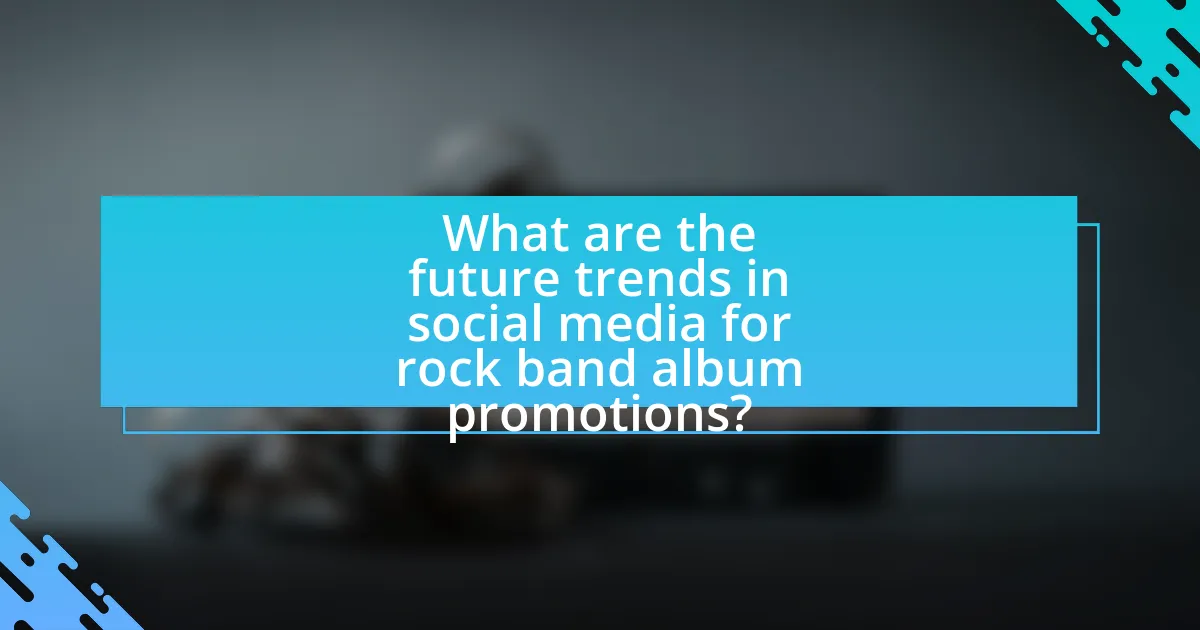
What are the future trends in social media for rock band album promotions?
Future trends in social media for rock band album promotions include the increased use of immersive technologies like augmented reality (AR) and virtual reality (VR) to create engaging fan experiences. These technologies allow bands to host virtual concerts and interactive album listening parties, enhancing fan interaction and engagement. Additionally, the rise of short-form video content on platforms like TikTok is reshaping promotional strategies, as bands leverage viral challenges and snippets of their music to reach wider audiences. According to a 2022 report by Statista, TikTok’s user base has grown to over 1 billion monthly active users, making it a crucial platform for music discovery and promotion. Furthermore, personalized marketing through data analytics will enable bands to target specific demographics more effectively, ensuring that promotional content resonates with their audience.
How is technology shaping the future of album promotions on social media?
Technology is significantly shaping the future of album promotions on social media by enabling targeted marketing, enhancing audience engagement, and facilitating real-time analytics. Advanced algorithms allow platforms like Facebook and Instagram to deliver personalized content to users, increasing the likelihood of reaching potential fans. For instance, data from Statista indicates that 79% of marketers believe that social media is an effective channel for promoting music, highlighting its growing importance. Additionally, tools such as live streaming and interactive posts foster direct interaction between artists and fans, creating a more immersive promotional experience. This shift towards technology-driven strategies is evidenced by the success of campaigns like Billie Eilish’s album release, which utilized social media platforms to generate buzz and engage her audience effectively.
What emerging platforms should rock bands consider for promotions?
Rock bands should consider platforms like TikTok, Discord, and Bandcamp for promotions. TikTok’s algorithm allows for viral music exposure, with 67% of users discovering new music through the app, making it a powerful tool for reaching younger audiences. Discord offers a community-driven space where bands can engage directly with fans, fostering loyalty and interaction. Bandcamp allows artists to sell music directly to fans, providing a platform for independent promotion and revenue generation, with 80% of sales going directly to the artists. These platforms collectively enhance visibility and engagement for rock bands in the digital landscape.
How can virtual reality and augmented reality be integrated into promotions?
Virtual reality (VR) and augmented reality (AR) can be integrated into promotions by creating immersive experiences that engage consumers and enhance brand interaction. For instance, rock bands can use VR to offer virtual concerts, allowing fans to experience live performances from their homes, which has been shown to increase fan engagement and ticket sales. Additionally, AR can be utilized in promotional materials, such as album covers that come to life through a smartphone app, providing interactive content that deepens the connection between the band and its audience. Research indicates that 61% of consumers prefer brands that offer interactive experiences, highlighting the effectiveness of VR and AR in promotional strategies.
What are the implications of changing consumer behavior on social media?
Changing consumer behavior on social media significantly impacts marketing strategies for rock band album promotions. As consumers increasingly seek authentic engagement and personalized content, bands must adapt by creating more interactive and relatable marketing campaigns. For instance, a study by Nielsen in 2021 found that 76% of consumers prefer brands that engage with them on social media, indicating that traditional promotional methods are less effective. This shift necessitates a focus on user-generated content and community-building efforts, as fans are more likely to support bands that foster a sense of belonging and connection. Additionally, the rise of short-form video content, as seen on platforms like TikTok, has changed how music is consumed and promoted, leading to viral trends that can rapidly elevate a band’s visibility.
How do shifts in music consumption affect promotional strategies?
Shifts in music consumption significantly affect promotional strategies by necessitating a transition from traditional marketing methods to digital and social media-focused approaches. As streaming services have become the primary mode of music consumption, artists and labels are increasingly leveraging platforms like Instagram, TikTok, and YouTube to engage with audiences directly. For instance, a report by the Recording Industry Association of America (RIAA) indicates that streaming accounted for 83% of the U.S. music industry’s revenue in 2020, highlighting the need for promotional strategies that prioritize online visibility and engagement. Consequently, promotional campaigns now often include viral challenges, influencer partnerships, and targeted social media ads to reach potential listeners effectively.
What trends in audience interaction should bands be aware of?
Bands should be aware of the trend of increased audience engagement through social media platforms, where real-time interaction enhances fan loyalty and participation. Research indicates that 79% of consumers are more likely to engage with brands that respond to their social media inquiries, highlighting the importance of timely communication. Additionally, live streaming events and virtual meet-and-greets have gained popularity, allowing bands to connect with fans globally, as evidenced by a 2021 report showing a 50% increase in virtual concert attendance compared to pre-pandemic levels. These trends emphasize the necessity for bands to actively utilize social media for meaningful audience interaction.
What practical tips can rock bands follow for successful social media promotions?
Rock bands can achieve successful social media promotions by consistently engaging with their audience, utilizing high-quality visuals, and leveraging analytics to refine their strategies. Engaging with fans through regular updates, live Q&A sessions, and behind-the-scenes content fosters a sense of community and loyalty. High-quality visuals, including professional photos and videos, capture attention and enhance the band’s image, as studies show that posts with images receive 94% more views than text-only posts. Additionally, using analytics tools to track engagement metrics allows bands to understand what content resonates with their audience, enabling them to tailor their promotions effectively.
How can bands create a consistent posting schedule for maximum impact?
Bands can create a consistent posting schedule for maximum impact by utilizing a content calendar that outlines specific dates and times for posts across various platforms. This approach allows bands to plan their content in advance, ensuring regular engagement with their audience. Research indicates that brands that post consistently see a 67% increase in engagement compared to those that do not. By analyzing audience insights, bands can determine optimal posting times when their followers are most active, further enhancing visibility and interaction.
What are the best practices for engaging with fans on social media?
The best practices for engaging with fans on social media include consistent interaction, authentic communication, and timely responses. Consistent interaction fosters a sense of community, as regular posts and updates keep fans informed and involved. Authentic communication builds trust; sharing behind-the-scenes content or personal stories resonates with fans and strengthens their connection to the band. Timely responses to comments and messages demonstrate that the band values fan input, enhancing loyalty. According to a study by Sprout Social, 70% of consumers feel more connected to brands with CEOs who are active on social media, highlighting the importance of personal engagement in building fan relationships.

